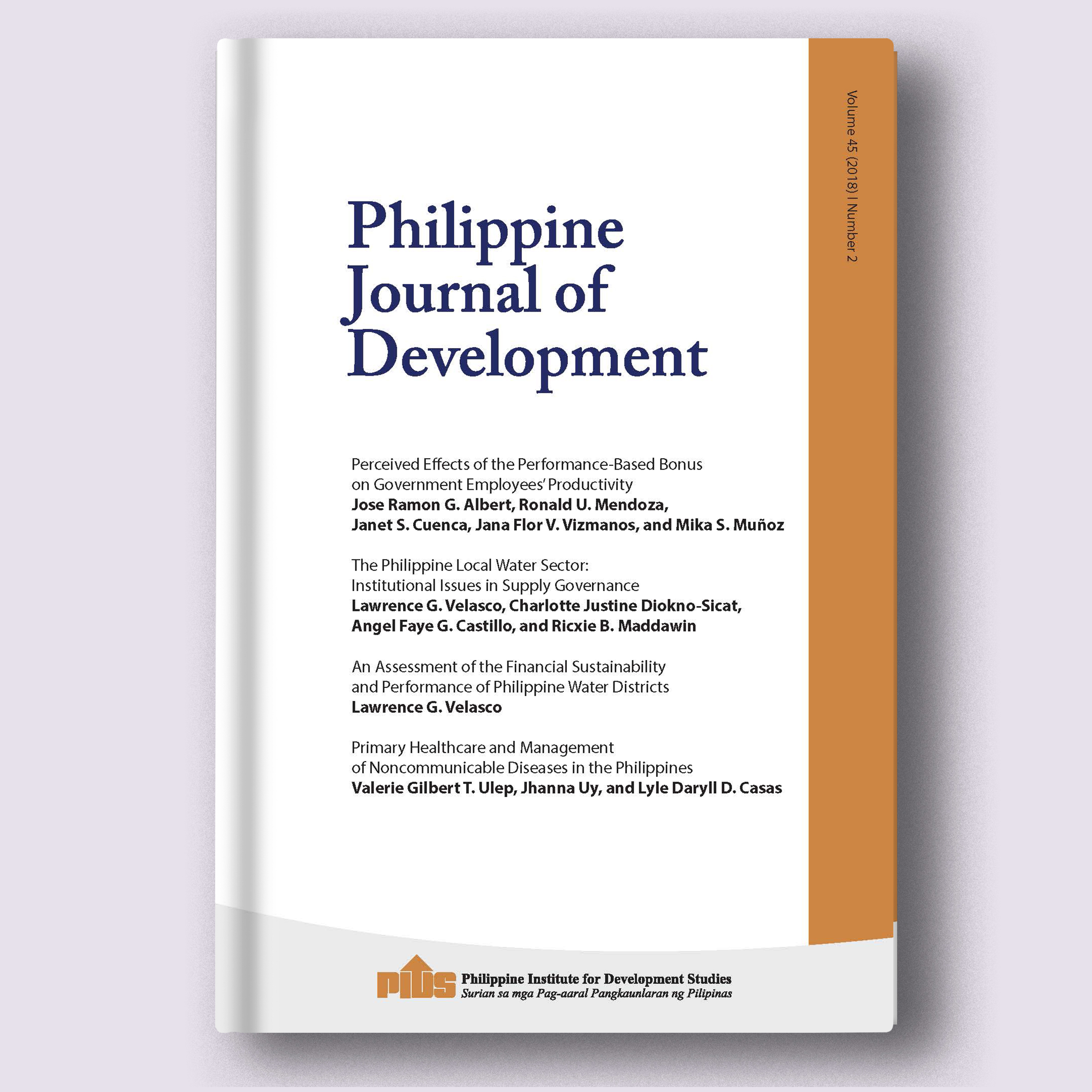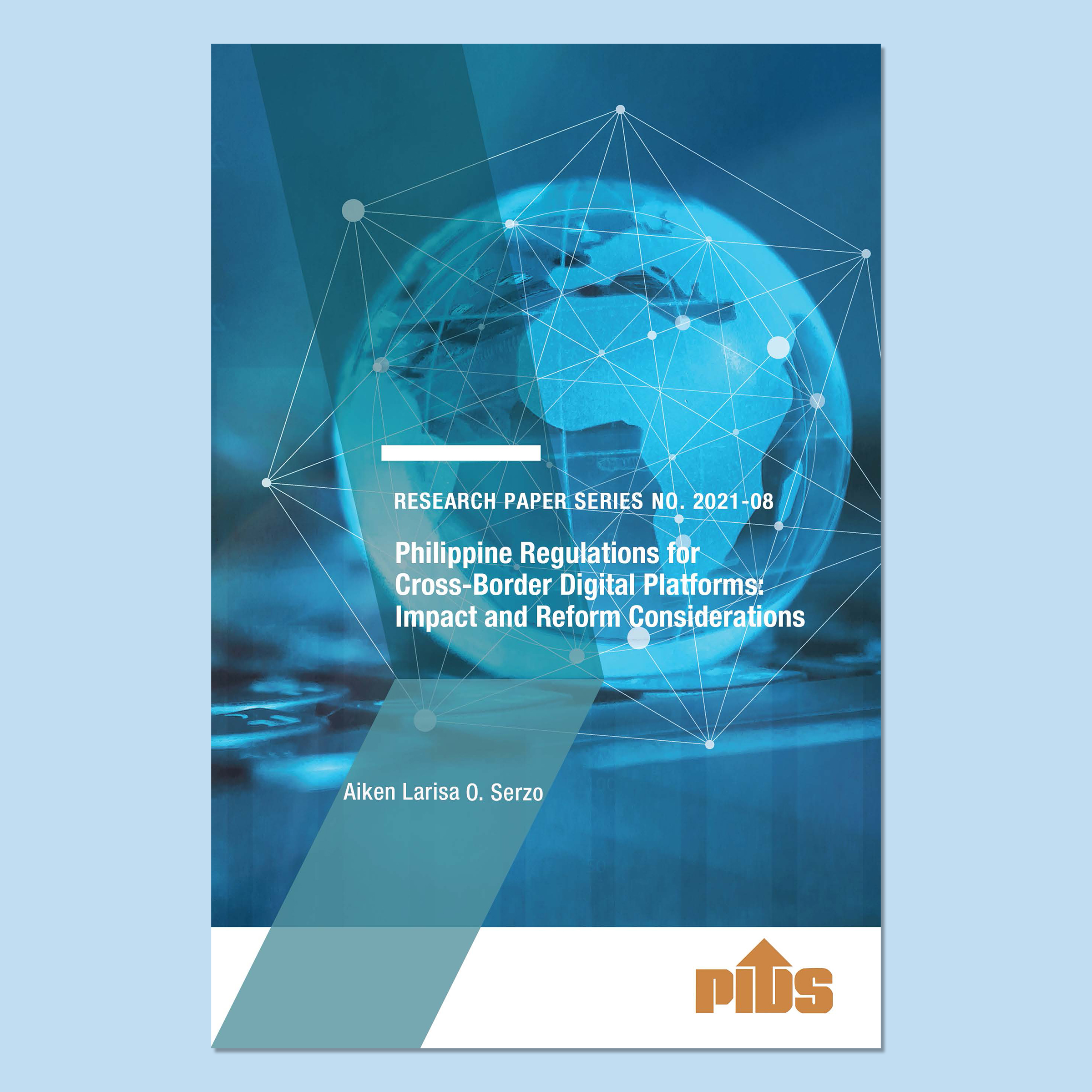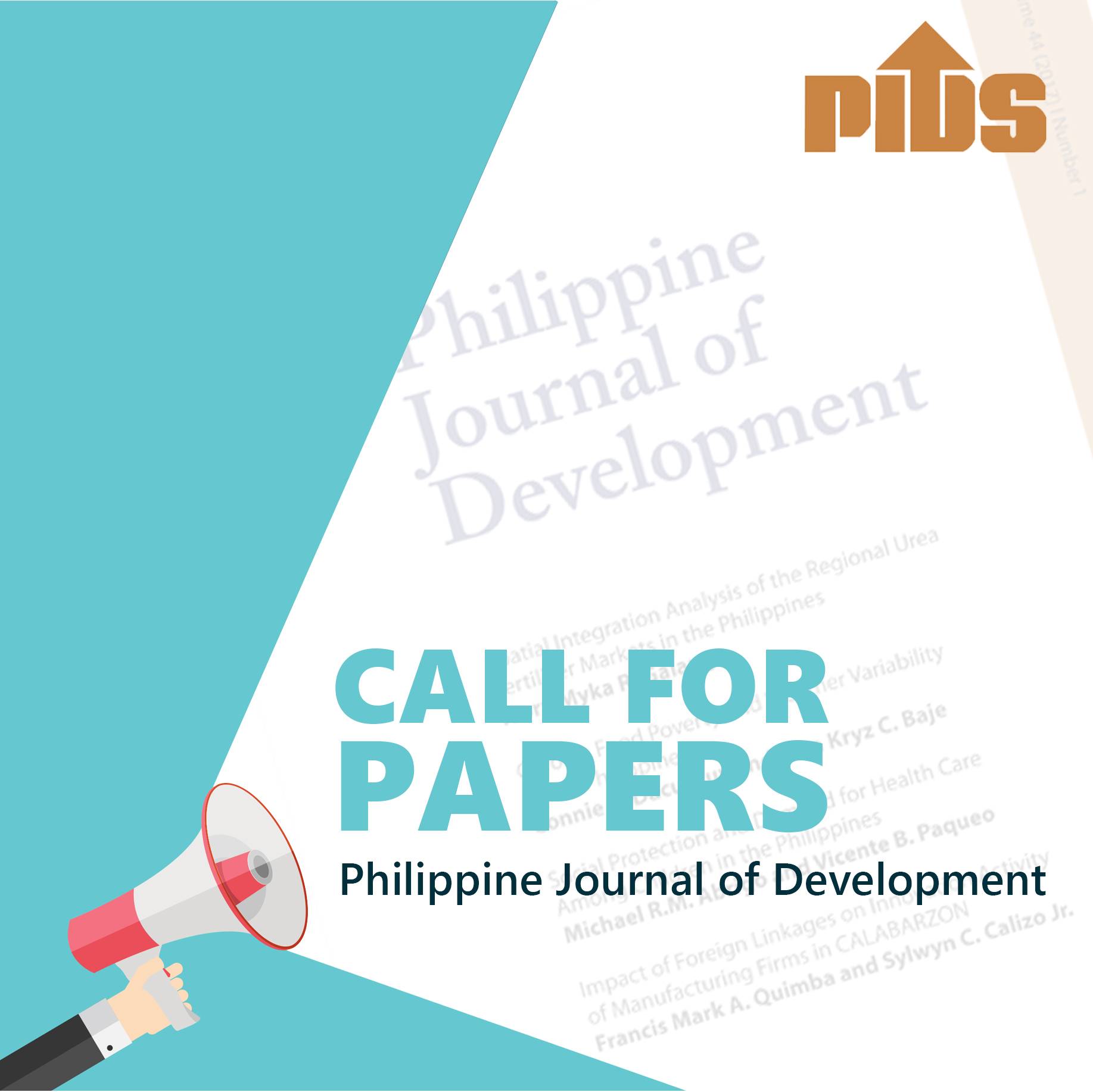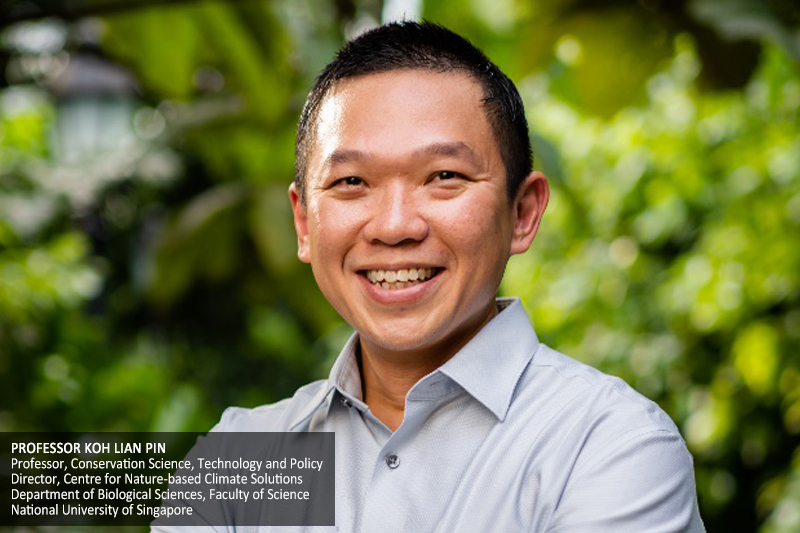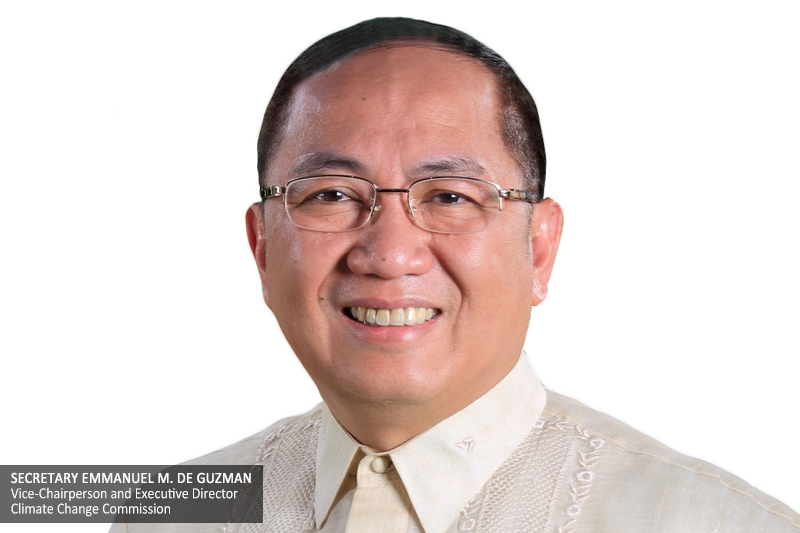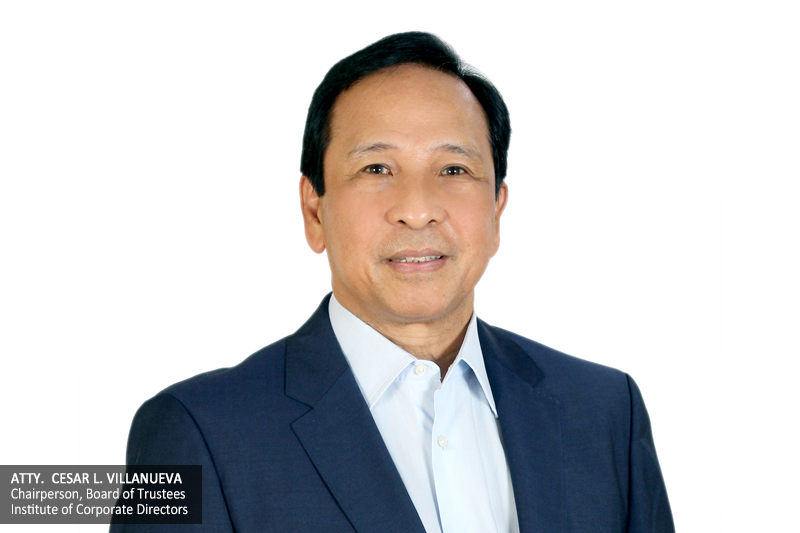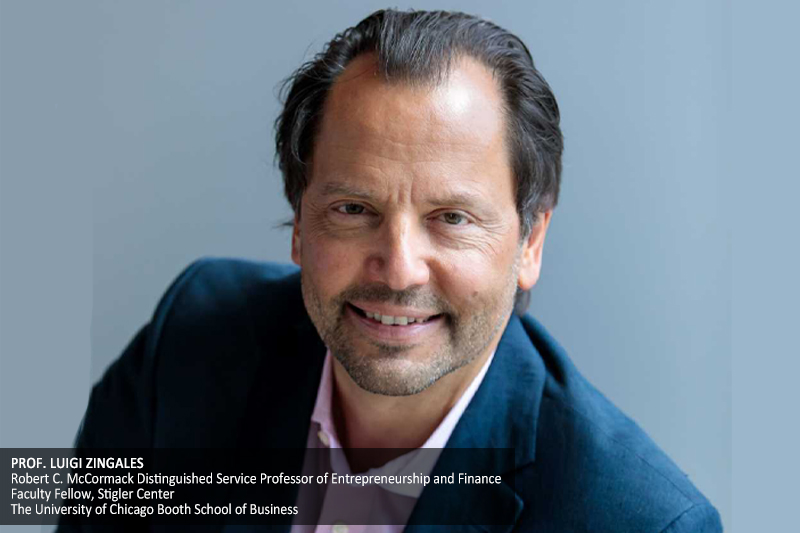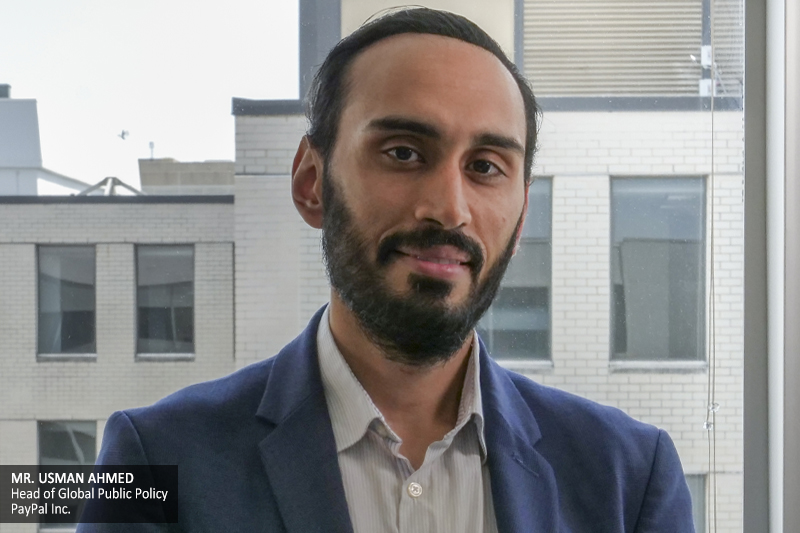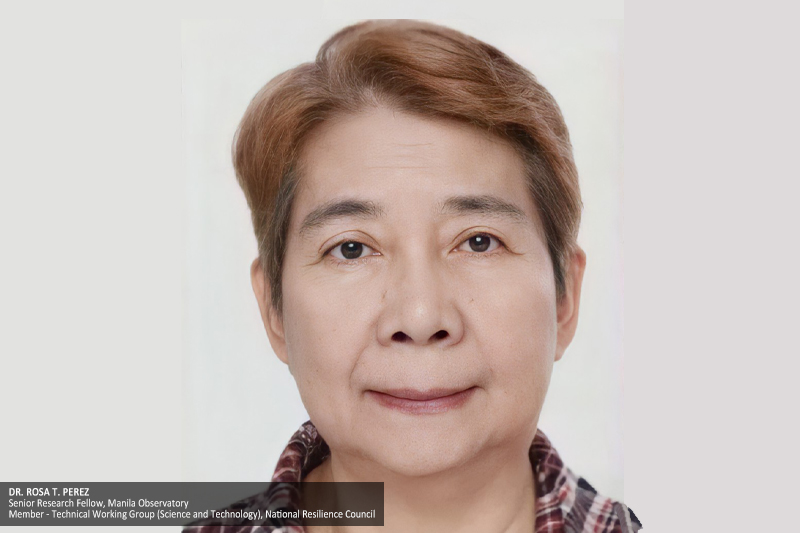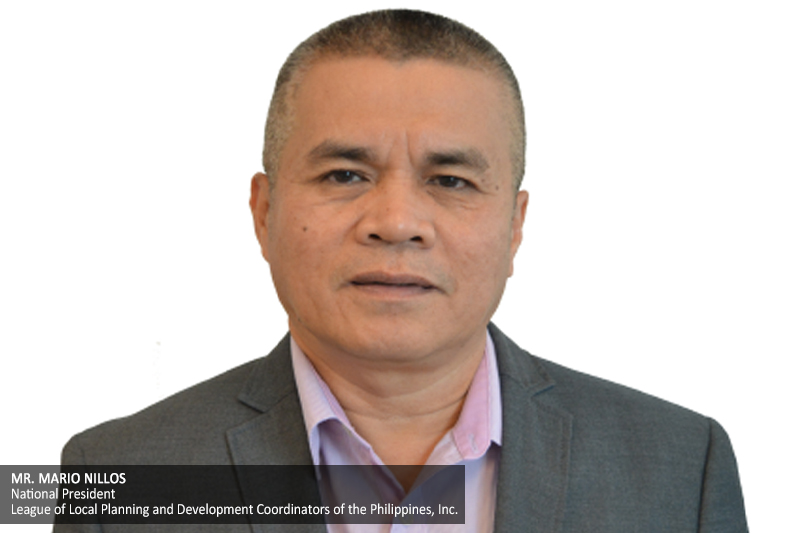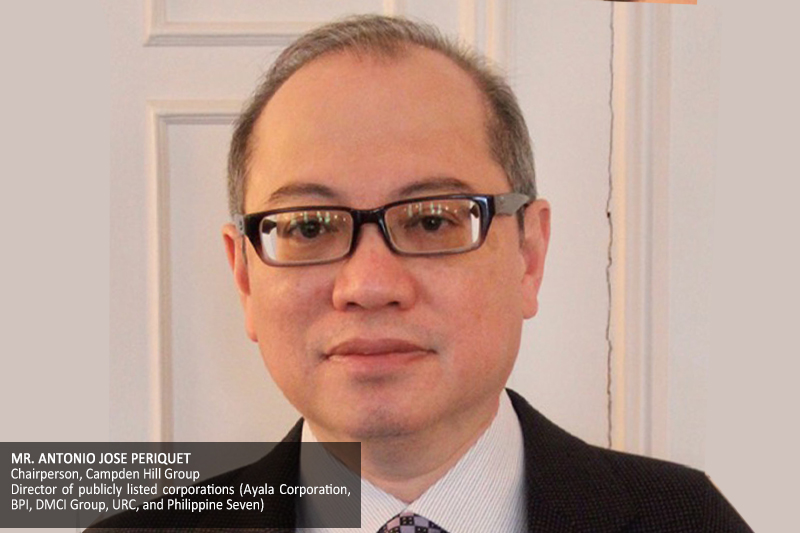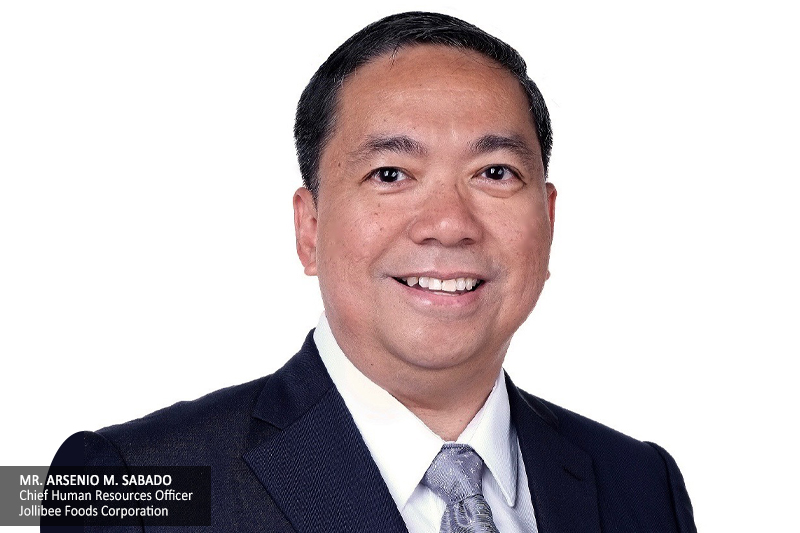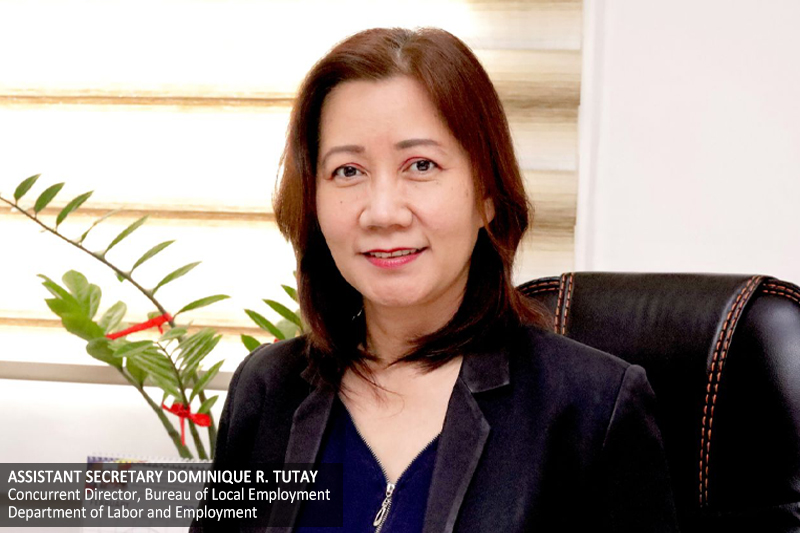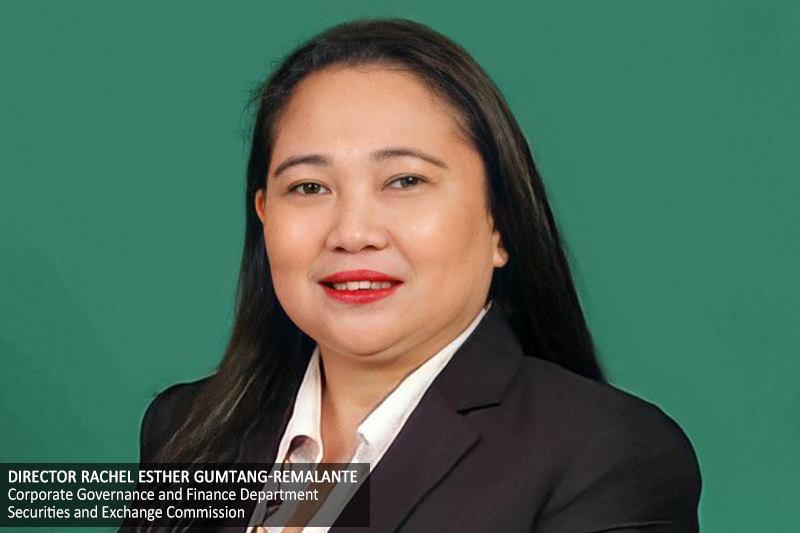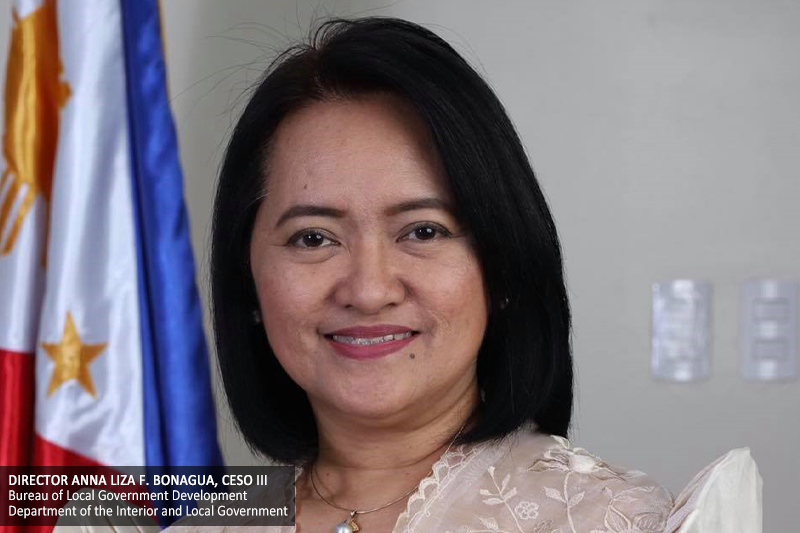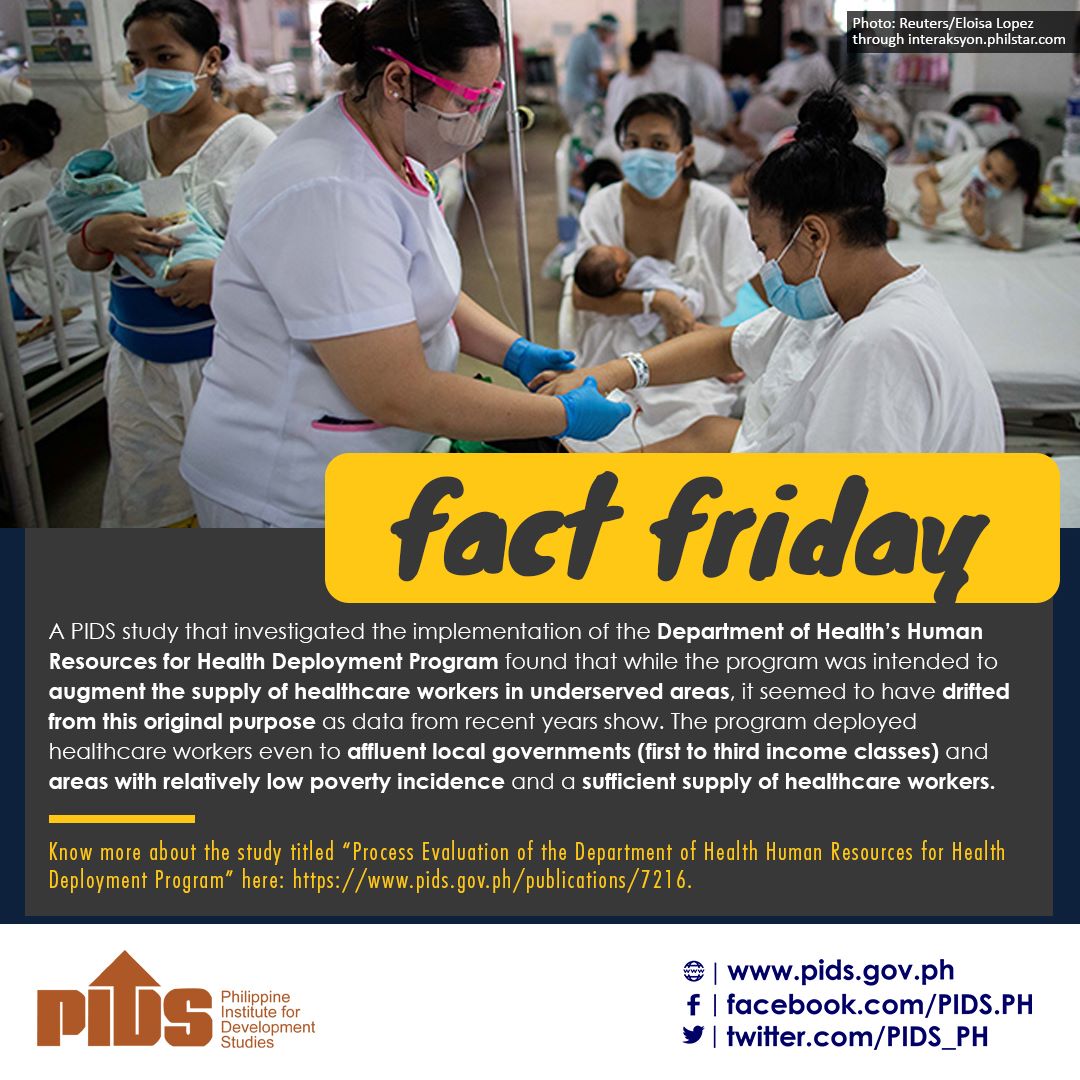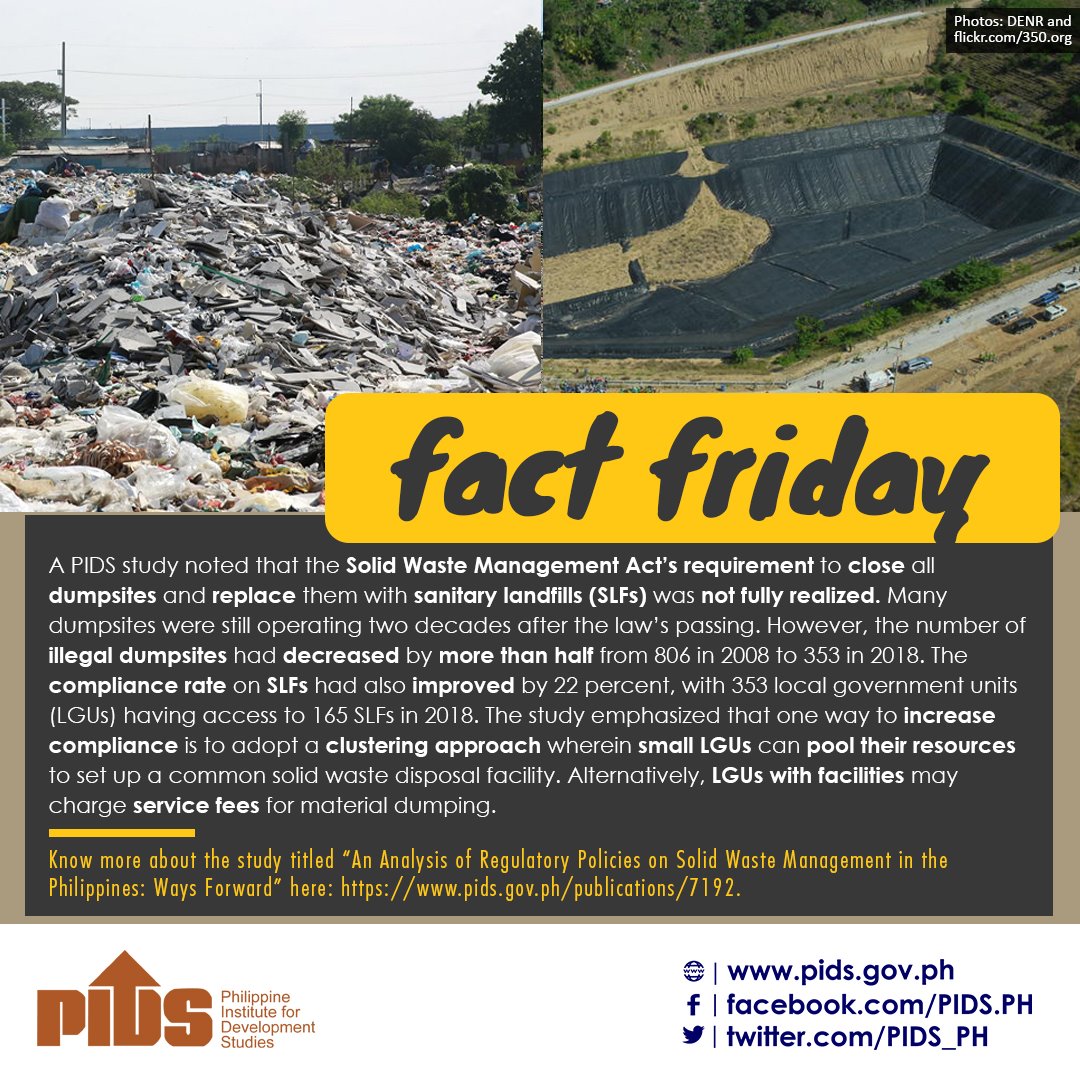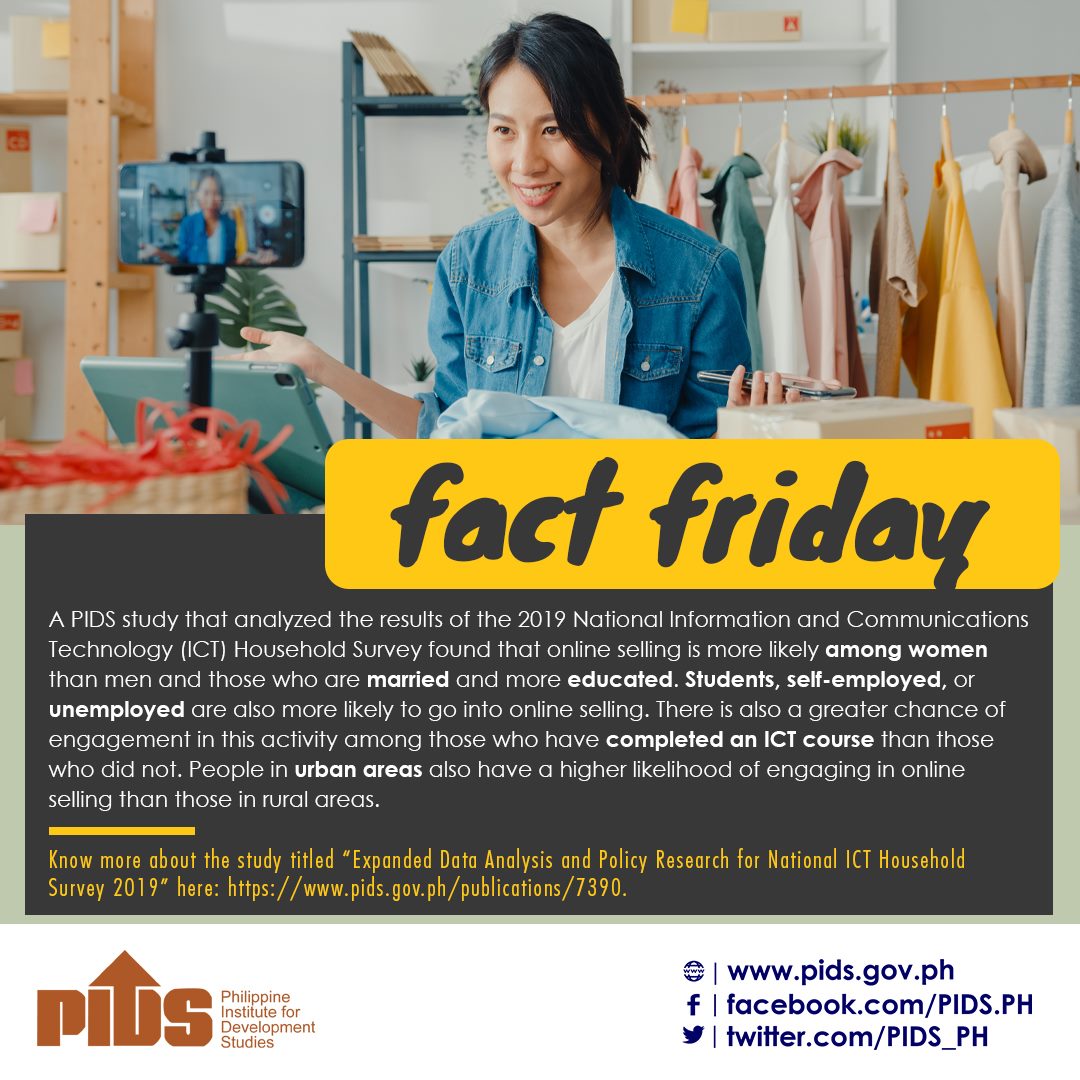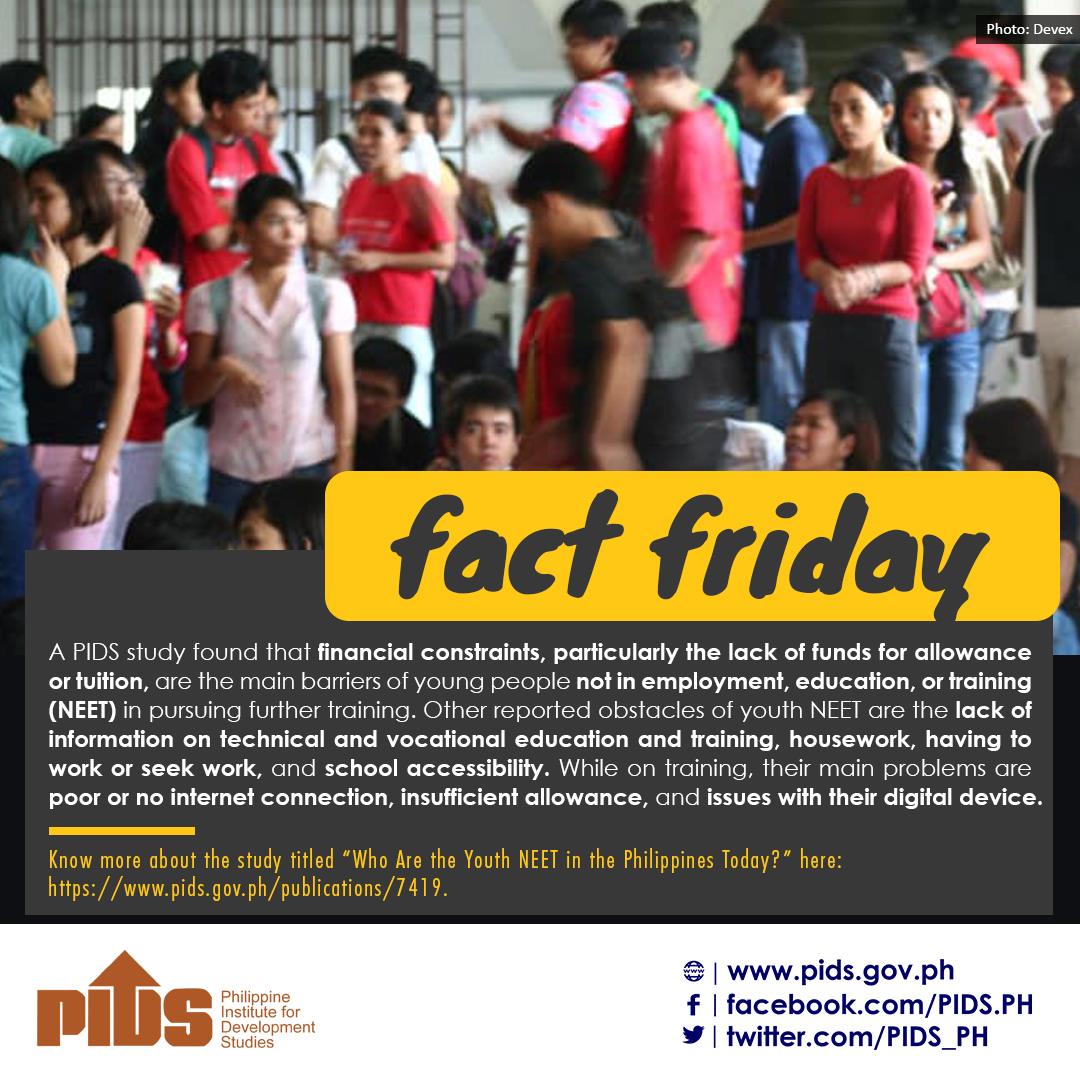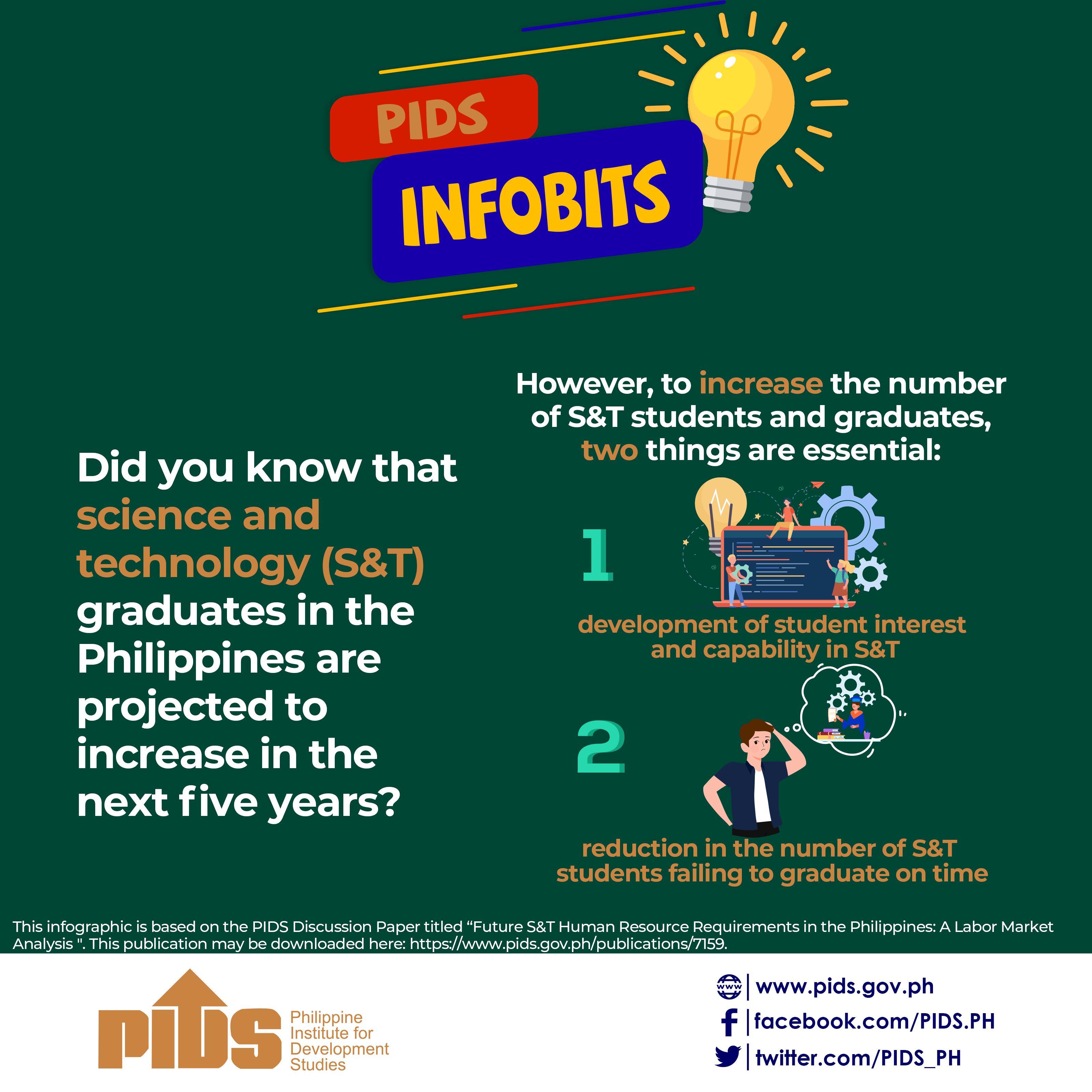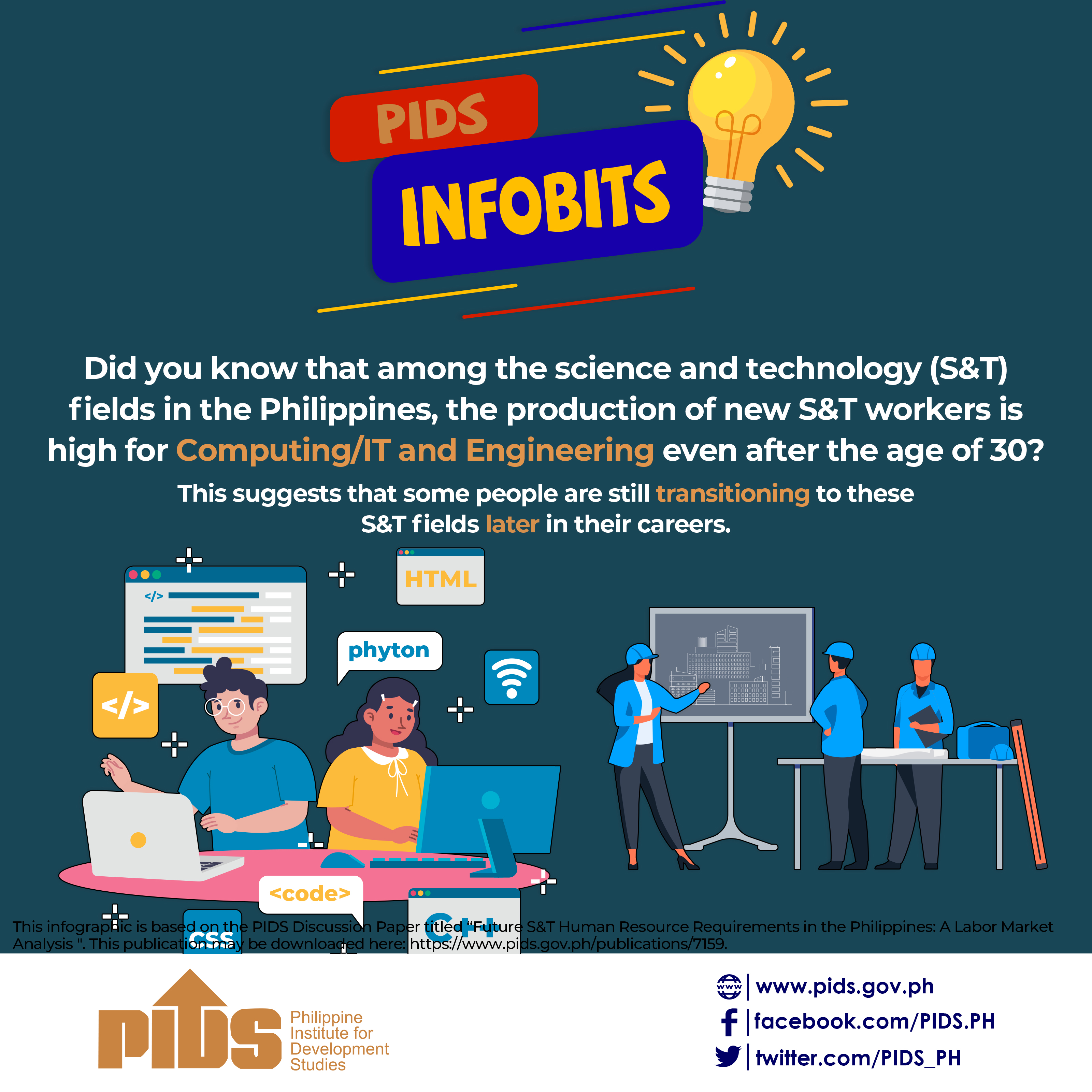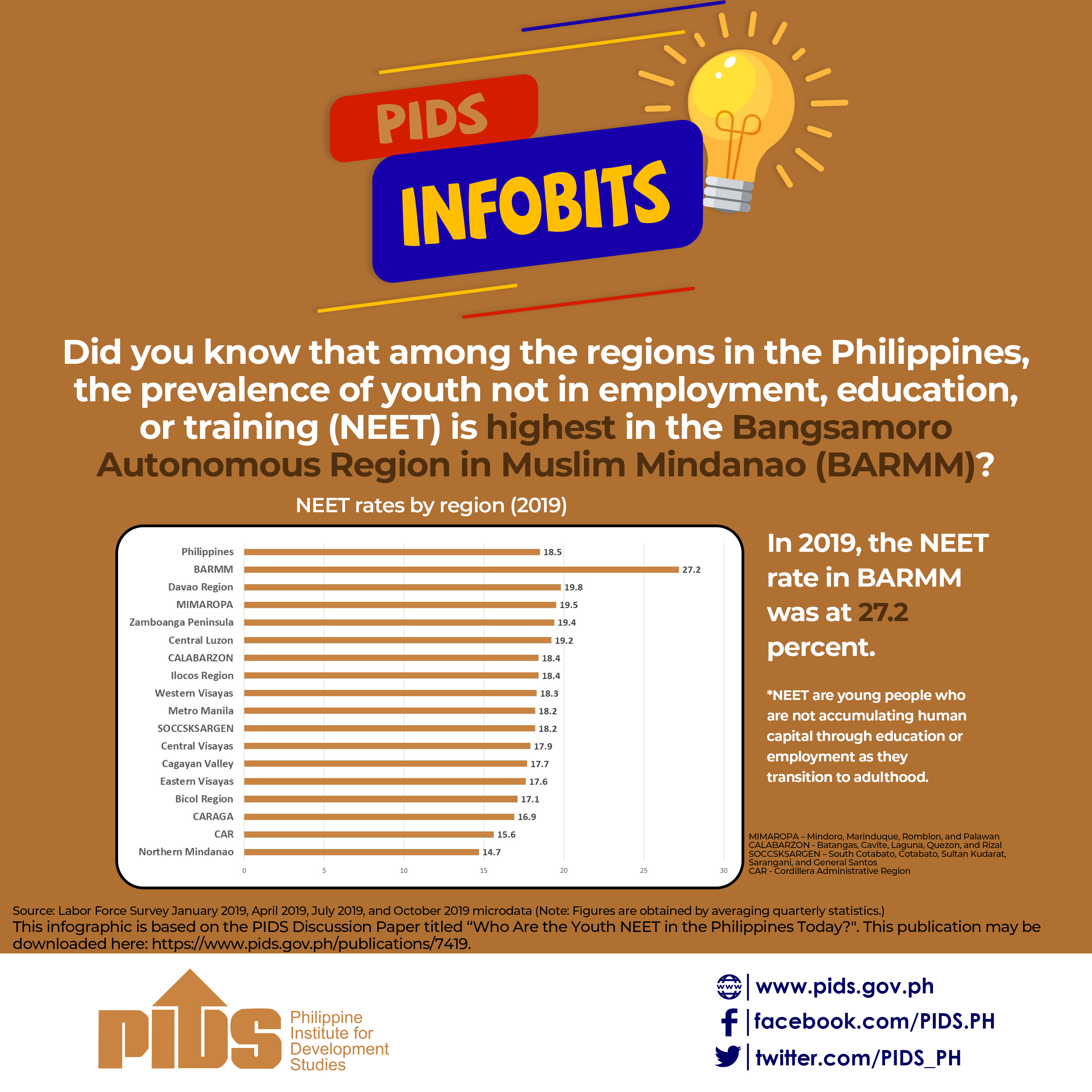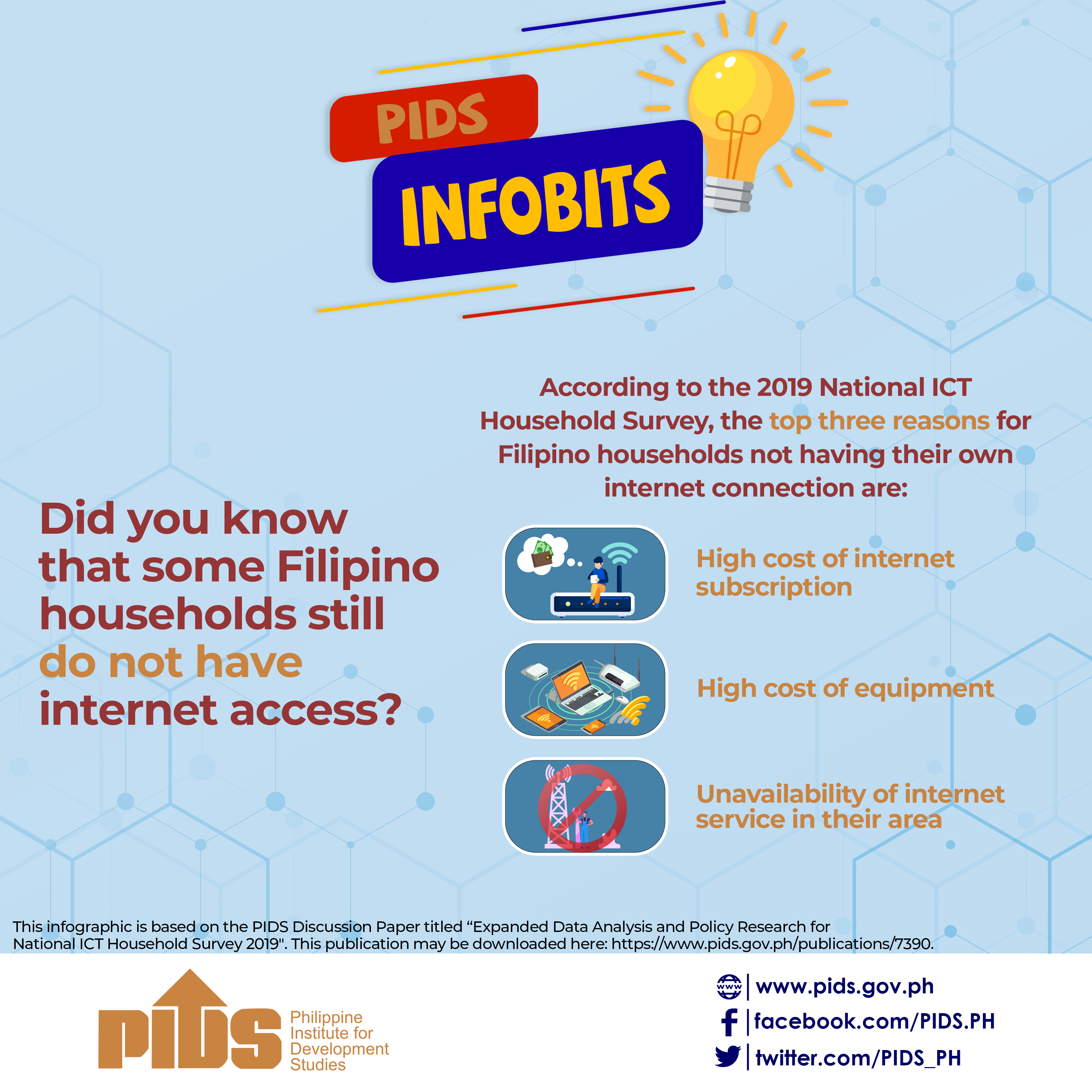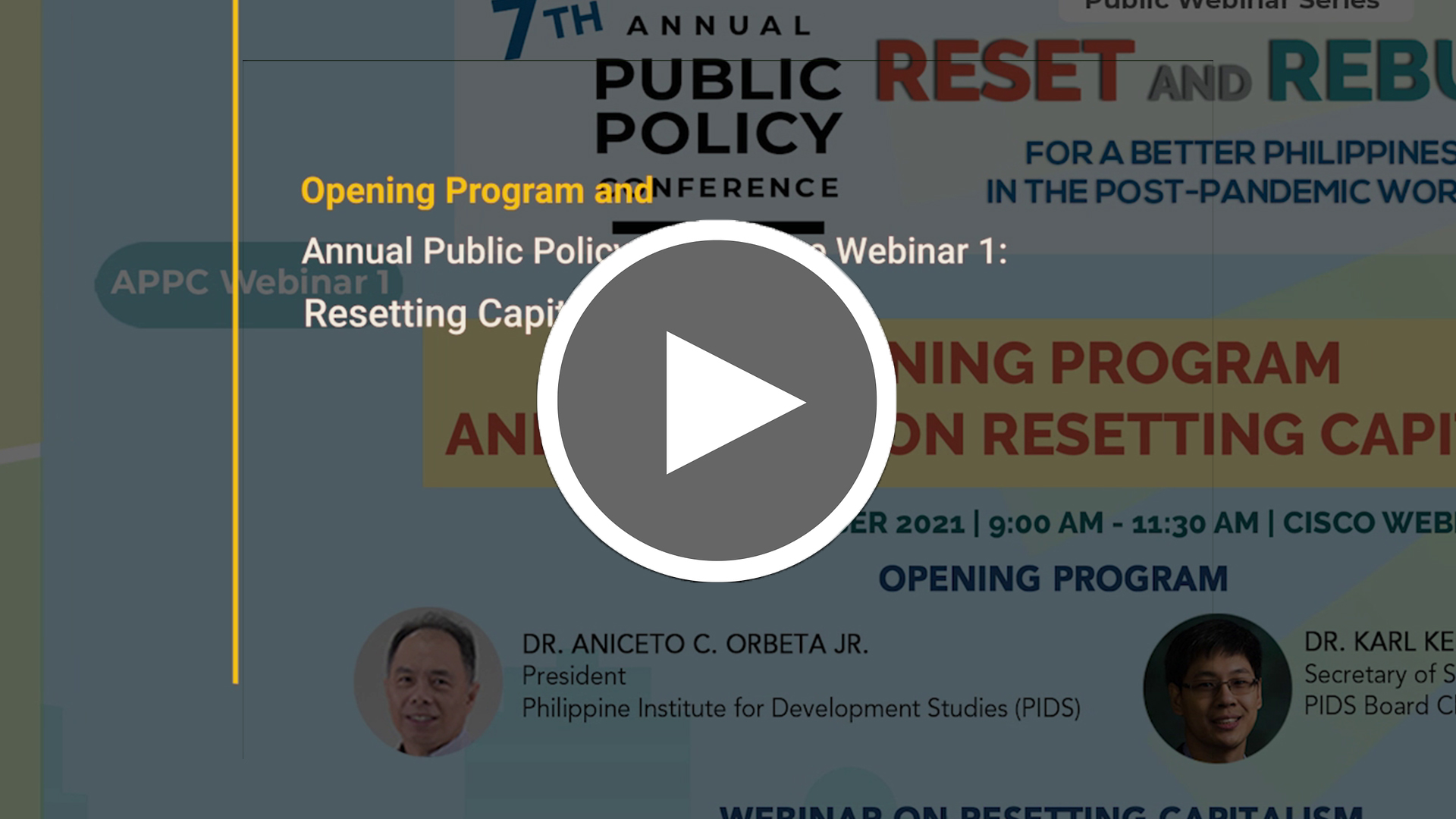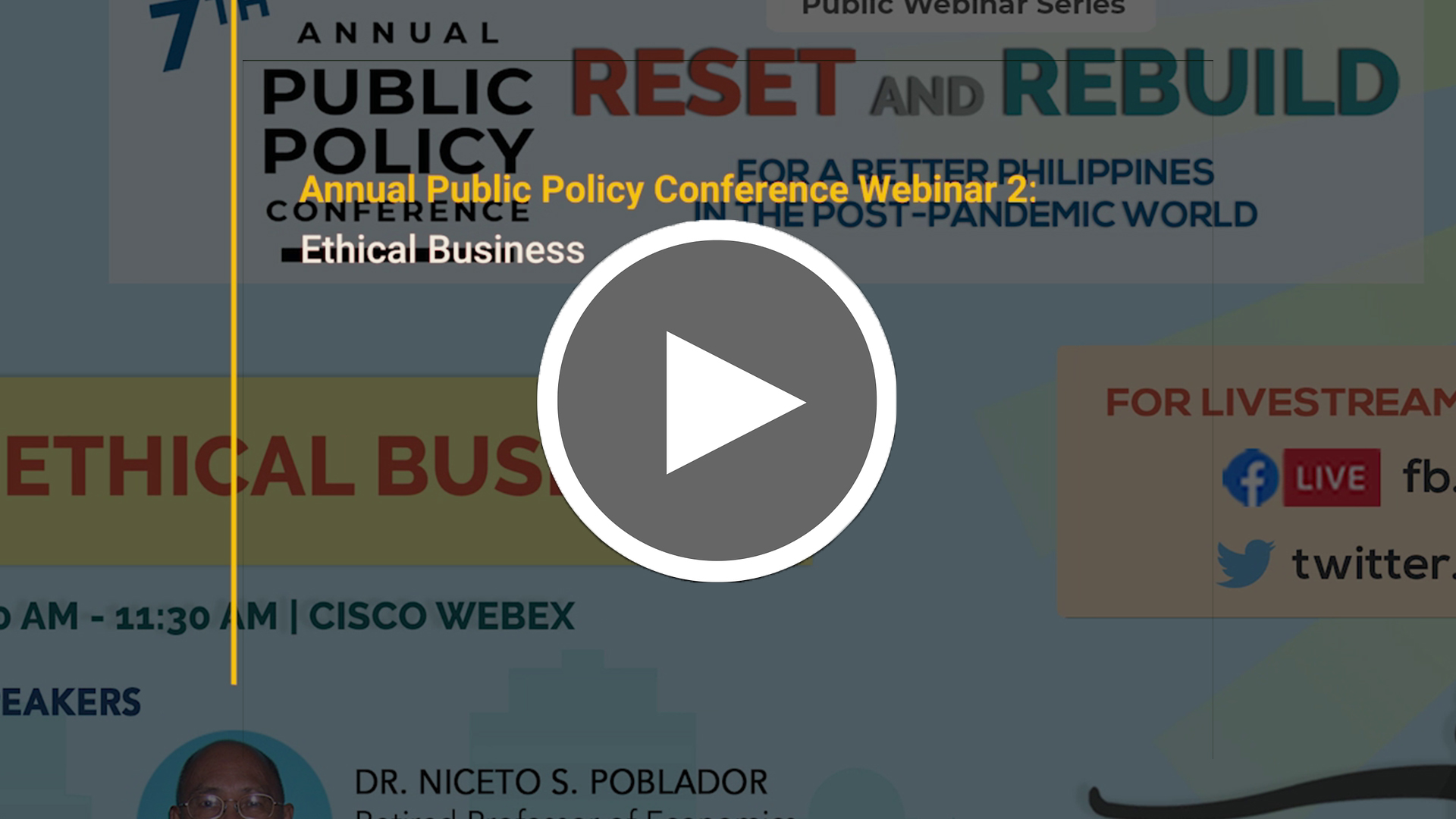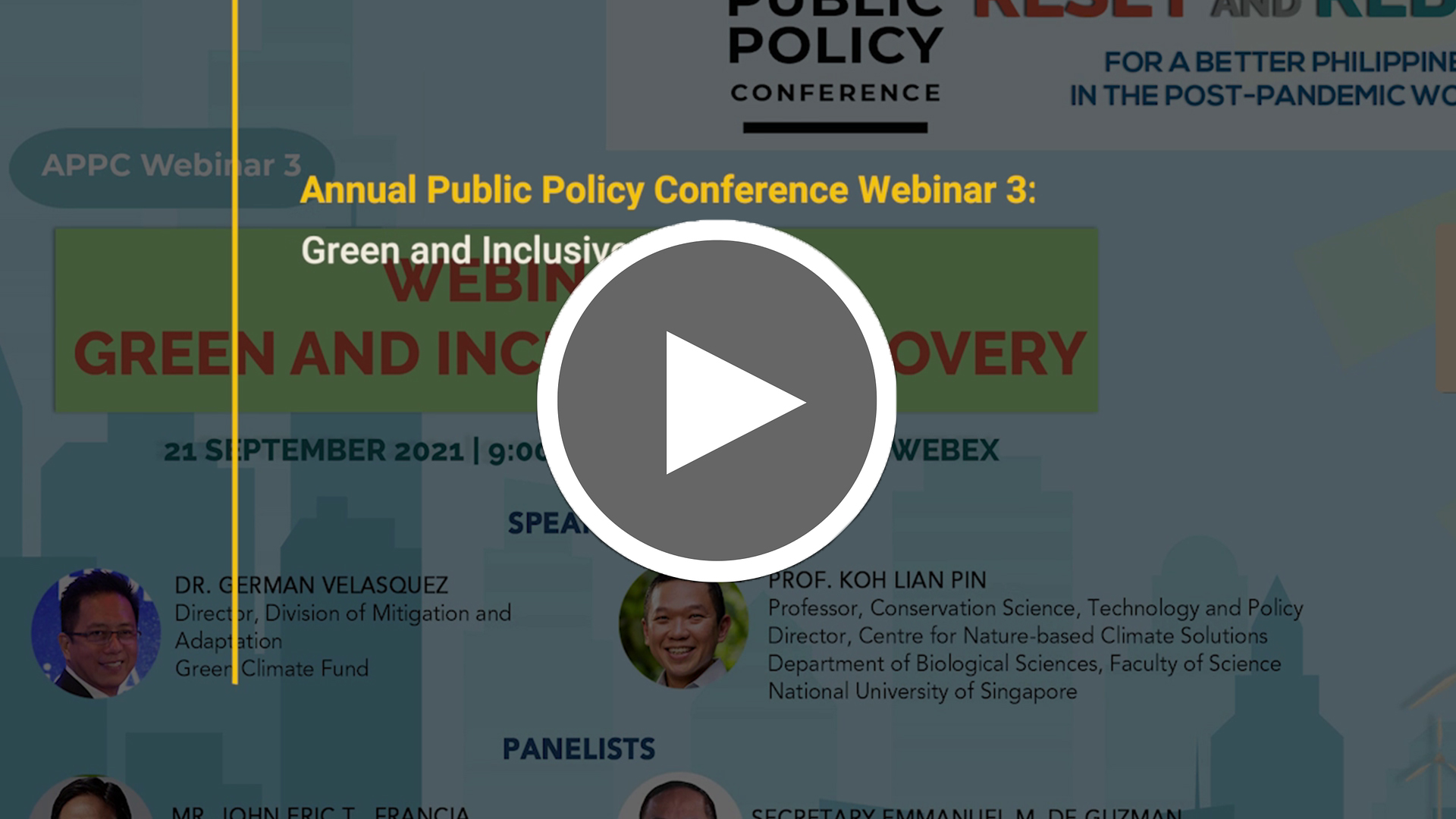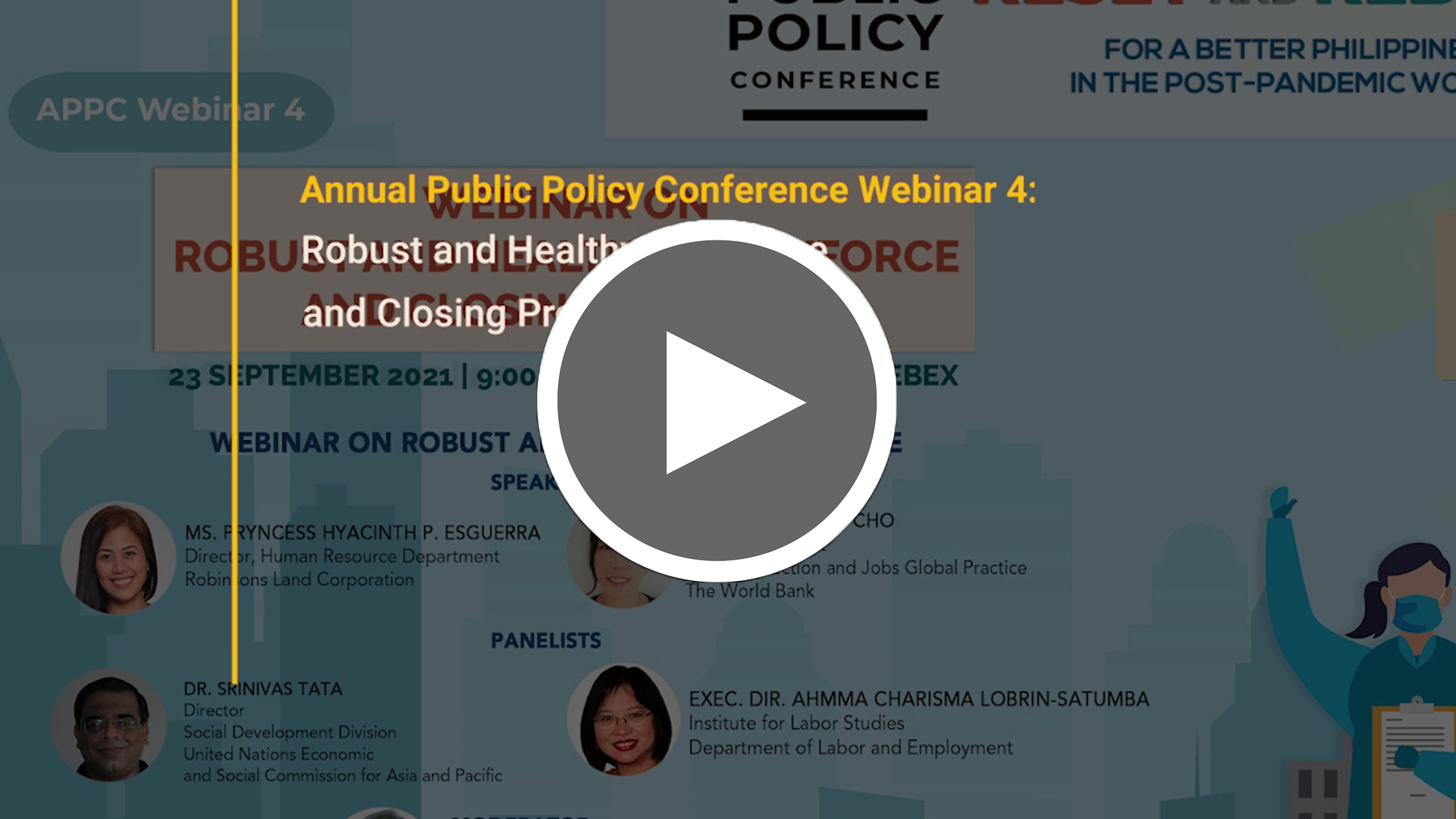Having trouble reading this email? View it in your browser. |
||||
 |
||||
|
||||
PHILIPPINE JOURNAL OF DEVELOPMENT
This issue of the Philippine Journal of Development contains articles on the Performance-Based Bonus (PBB), the Philippine water sector, local water districts, and noncommunicable diseases (NCDs). The first article evaluates the PBB and shows its effects on the productivity of government employees. The second paper reviews the mandates of primary regulatory bodies responsible for local water services in the Philippines. The third article examines the financial conditions of water districts and their role in attaining the country's water supply and sanitation goals. The last article looks at the readiness of the Philippine primary healthcare system in managing and treating NCDs. Click here to download the journal.
Articles: Perceived Effects of the Performance-Based Bonus on Government Employees’ Productivity The Philippine Local Water Sector: Institutional Issues in Supply Governance An Assessment of the Financial Sustainability and Performance of Philippine Water Districts Primary Healthcare and Management of Noncommunicable Diseases in the Philippines
RESEARCH PAPER SERIES
This study reviews Philippine regulations governing digital platforms with cross-border operations and the impacts of these laws on the ability of platforms to innovate and participate in the global economy. There is no shortage of constitutional, statutory, and policy support for innovation, e-commerce, digitization, and entrepreneurship. However, there is a disconnect between these policies and the environment created by how implementing statutes and regulations evolved. These regulatory gaps could negatively impact digital platforms in two ways. First, they inhibit innovation because uncertainties could limit funding opportunities and discourage firms from developing or launching novel products. Second, gaps and overlaps could lead to cross-border and domestic regulatory arbitrage, forcing firms to relocate to areas or jurisdictions where risks are more manageable. Therefore, this paper recommends a recalibration of regulations, taking into consideration the policy objectives on innovation vis-a-vis the protection of Filipino consumers and entrepreneurs. Policymakers could take advantage of regulatory intersections to further innovation policies. They could also consider various interventions to achieve such reforms without necessarily resorting to constitutional changes. The government could review its taxation, labor, consumer protection, and investment regulations, ensuring that these laws do not stifle innovation. Click here to download the research paper.
POLICY NOTE PN 2021-10: Why Literacy Measurement Deserves Rethinking Basic literacy is nearly universal in the Philippines, according to data from the 2015 Population Census. However, underlying issues such as gender disparity, geographical location, socioeconomic status, and digital divide are concomitant to literacy gaps, especially among children. This Policy Note examines several nationally representative surveys measuring literacy. It finds that both basic and functional literacy data do not fully capture the continuum of literacy concepts. Likewise, there are biases in reported basic literacy versus tested skills. Thus, the study recommends conducting diagnostic assessments to measure functional literacy better. Moreover, it suggests designing improved policies to vigorously address persisting disparities in literacy and school participation between boys and girls and across regions. Lastly, the study urges policymakers and stakeholders to work hand in hand on improving Filipinos' literacy, numeracy, and digital competencies. Click here to download the policy note.
DISCUSSION PAPER SERIES DP 2021-22: Reset and Rebuild for a Better Philippines in the Post-pandemic World Despite the continuing threat of the COVID-19 virus mutating, the pandemic will eventually end given widespread vaccination and virus suppression policies. Policymakers need to think ahead, assess scenarios of possible futures, and start to reset and rebuild toward a better Philippines in the post-pandemic environment. Owing to the many societal issues that the pandemic exposed and exacerbated, thinkers were compelled to scrutinize the current flaws in the capitalist system and how these can be fixed to ensure a more sustainable existence. The Great Reset agenda by the World Economic Forum is one example. This agenda is contextualized in the Philippine situation through three major strategies, namely: making businesses more ethical through stakeholder capitalism; pursuing a green and inclusive recovery; and maintaining a robust and healthy workforce. Policy insights and recommendations for each strategy include the following: for ethical business, enjoin companies to adopt universally recognized environmental, social and governance metrics, strengthen the country's competition framework, and create an equal environment for different businesses in similar industries; for green and inclusive recovery, make space for greening in the stimulus packages, create a pipeline of needed climate-smart infrastructure projects, identify and invest in green growth areas, support the calls for a green new deal in Southeast Asia, push Philippine concerns in the global debates on climate actions, and find alternatives in the face of carbon-related tradeoffs; and for a robust and healthy workforce, invest in reskilling and upskilling programs, revamp the social protection system, address the digital divide, and address the needs of the workers of the future. Click here to download the discussion paper.
|
November 4, 2021, 2:00PM-4:30PM November 11, 2021, 2:00PM-4:30PM November 18, 2021, 2:00PM-4:30PM November 25, 2021, 2:00PM-4:30PM
|
|||
Nature-based solutions and cutting down carbon dioxide (CO2) emissions to net zero must be done within the next 30 years to achieve the Paris climate goal of limiting global warming to below 2°C above pre-industrial levels.
There have been a “concomitant tightness in the supply in the power sector” and “an increased rate of outage of coal plants in Luzon” in recent years.
“The pandemic is not the only threat we face today. Climate change is a much bigger threat that has already taken so much away from us. And it will continue to do so, killing our people, destroying our environment, and bringing our cities and communities into ruin if we allow it to maintain its present trajectory.”
The intent of Republic Act 11232 or the Revised Corporation Code (RCC) of the Philippines to criminalize violators may create a ‘chilling effect’ on commercial infrastructure in promoting the use of the corporate medium in pursuing investments and commercial activities.
“Today, capitalism is by and large corporate capitalism. If we want to think about how to reset it, we need to rethink about the way corporations are run.”
Amid the ongoing debate sparked by the COVID-19 pandemic on whether businesses should shift from ‘shareholder capitalism’ to ‘stakeholder capitalism’, Paypal Inc., a multinational financial technology company, showed it can be done.
The lockdowns during the pandemic caused a large drop in carbon dioxide (CO2) emissions globally in 2020. However, this positive impact on the environment is unsustainable, and efforts should be focused on promoting green and blue recovery instead, according to a science and technology (S&T) expert.
While local governments’ efforts to align their plans with the country’s national development goals are seen to be effective, these need to be sustained.
Adopting environment, social, and governance (ESG) policies could lead to positive corporate financial performance.
“We have a ‘broken’ capitalist system,” Antonio Jose Periquet, chairperson of Campden Hill Group and director of publicly listed corporations, said during the first of the four-part webinar series of the 7th Annual Public Policy Conference (APPC).
Employees’ welfare should always come first, said Mr. Arsenio Sabado, chief human resources officer of Jollibee Foods Corporation (JFC), during the 19th Development Policy Research Month kick-off forum last September.
Young workers were among those hit hardest by the COVID-19 pandemic, according to a Department of Labor and Employment (DOLE) official.
A company should be socially responsible in all its dealings, especially within the community where it operates.
Implementing results matrices in local government units is key to measuring their contributions in achieving the Philippine Development Plan (PDP) 2017–2022 and the Sustainable Development Goals.
|
||||
FACT FRIDAY
INFOBITS
Webinar Bites Watch these videos and get a glimpse of the highlights of the 7th Annual Public Policy Conference during the 19th Development Policy Research Month, with the theme "Reset and Rebuild for a Better Philippines in the Post-Pandemic World", or in Filipino, "Muling Magsimula at Magtayo Tungo sa Mas Matatag na Pilipinas Pagkatapos ng Pandemya", held on September 14, 16, 21, and 23. |
||||
Need help? Have feedback? Feel free to contact us. |
||||
